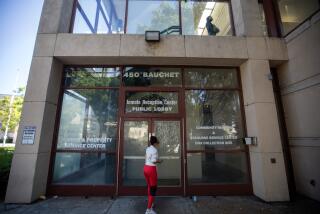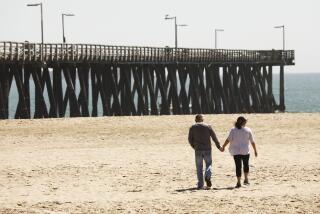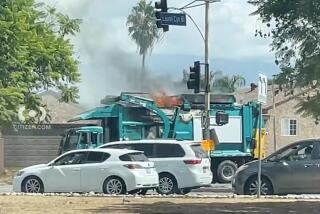School Closed for Day After Toxic Gas Escapes
La Habra High School students got an unexpected holiday Monday after a maintenance worker left a valve open while changing a chlorine tank on a swimming pool filter, causing toxic gas to spread across the campus, authorities said.
School was canceled for the day and only a skeleton crew remained to answer phones while La Habra’s 1,580 students and 120 teachers, administrators and staff were sent home as they arrived for classes this morning. Residents in the surrounding neighborhood were not evacuated because the pool is in the middle of the campus, La Habra Fire Capt. Jack Johnson said. By the time the fumes reached the edge of the campus, Johnson said, the chlorine had dissipated and was no longer dangerous.
“We are very fortunate it happened a half-hour prior to the opening of school,” said La Habra High Principal Tom Triggs. Teachers and administrators at nearby Walnut Elementary School, however, were instructed to take their students indoors as a precautionary measure, Police Capt. John Rees said.
Doug Bentley, the school maintenance worker who forgot to close the valve, was affected by the gas but managed to escape the filter room, Rees said. Bentley was taken to Friendly Hills Medical Center in La Habra where he was treated for respiratory problems and released, Rees said.
Firefighters shut off the gas at 7:50 a.m., about an hour after it began escaping. The delay in shutting off the tank was due to firefighters’ need to contact Bentley at the hospital to find out exactly what went wrong, authorities said.
The tank, which was full at the time, is 5 feet high and 14 inches in diameter, Johnson said. The tanks hold chlorine under pressure of about 150 pounds per square inch, Johnson said, and this one leaked about 50 pounds, or one-third of its contents.
La Habra High students will have to make up the school day at some point during the year, Triggs said. But makeup classes were the last thing on students’ minds Monday.
La Habra High freshmen Allison Miller, Meagan Mirth and Stefanie Bakke, all 14, were riding their bikes around town after buying an early lunch at Der Wienerschnitzel near the campus.
“All the kids were cheering,” Bakke said. “My brother went to a party with the seniors. . . . Freshmen weren’t invited.”
Mirth tried to talk her mother into driving them to the beach. “That’s where I wanted to go. She wouldn’t take us.”
Chlorine gas, which is injected into water for purification, is commonly used instead of liquid or powdered chlorine in large swimming pools because it is easier to store, even though it is potentially more dangerous, said La Habra Fire Chief Ben Wilkins. The chlorine needed for a pool that size is difficult to store unless the chlorine is concentrated in bottles, Wilkins said. The chlorine is actually in liquid form in the bottles and turns to gas only when it escapes.
“Chlorine injection is used in water treatment of all kinds,” Wilkins said. Several chlorine bottles are used at once in the La Habra High pool’s system, Wilkins said, and all the valves must be shut off before a bottle can be removed from the line. When Bentley removed a bottle at the end of the line Monday morning, he forgot to turn off one of the valves, causing a hose to pop loose and filling the filter room with chlorine.
Although it is commonly used to purify water, chlorine can be lethal. “They used it (as a weapon) in World War I,” said La Habra Fire Capt. Johnson. “It can cause pneumonia and sear your lungs.”
If someone ingests enough of the gas, Fire Chief Wilkins said, he or she will die “very rapidly and very painfully. It just shuts down your breathing system.” The chlorine will “attack any moist place on your body,” Wilkins said, “including your mouth, eyes, armpits and groin.”
Times staff writer Mary Lou Fulton contributed to this report.
More to Read
Sign up for Essential California
The most important California stories and recommendations in your inbox every morning.
You may occasionally receive promotional content from the Los Angeles Times.










